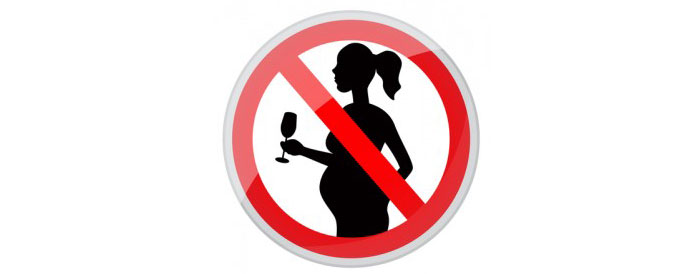
Avoid Even Light Alcohol Consumption During the First Trimester of Pregnancy
A new study suggests light alcohol consumption during the first trimester is linked to a higher risk of bearing a preterm or unexpectedly small baby, even if expectant mothers keep within the government-recommended limit of two units a week.
In addition, say researchers at the University of Leeds in the UK, who report their findings in the BMJ’s Journal of Epidemiology and Community Health, drinking alcohol in the weeks leading up to conception is also linked to smaller fetal growth.
The new finding adds to a debate, fueled by mixed evidence, that has been going on for some time about light alcohol consumption in pregnancy.
The authors note that when pregnant women drink alcohol, it crosses the placenta and results in nearly equal cocentrations in both the fetus and the mother.
However, while the effects of heavy drinking in pregnancy are well established, the effect of light drinking is not, and different studies have come to different conclusions about it, as have different health authorities.
Varied evidence and advice about light alcohol consumption in pregnancy (Read more about The Study Here )
Top 5 Myths About Drinking Alcohol During Pregnancy & Breastfeeding- DEBUNKED
[Original Source – pregnancystudies.org]
By: Chris Colón, MS, LCGC
Many women have questions about changing their diet and lifestyle in order to have a healthy baby. Often, the question “is it safe to drink during pregnancy or while breastfeeding?” comes up. For years, it has been recommended that women do not consume alcohol during pregnancy. However, some recent reports suggest occasional drinking is not harmful to a pregnancy. This information can be confusing and may leave you with more questions than answers.
Below are some of the common myths and facts about the use of alcohol during pregnancy and breastfeeding:
Myth – Drinking before finding out you are pregnant is safe.
Fact – Even though you may not realize you are pregnant, the baby is still growing and developing. Drinking at any time in pregnancy, even early on, might have some effects on the baby. It depends on several factors, including how much alcohol you were drinking, how often you drink, and if you continue to drink during pregnancy. It is always recommended for a pregnant woman to stop using alcohol, no matter how far along in her pregnancy she is. The baby will benefit by no longer being exposed to alcohol.
Myth – It’s safe to drink a small amount of alcohol later in pregnancy.
Fact – There are different opinions about this, which can be confusing. Babies grow and develop throughout the entire pregnancy. Right now, there is not enough known about how alcohol can possibly affect a baby at different times during pregnancy to be able to say that any time is safe for drinking alcohol. And, while drinking more alcohol puts the baby at greater risk for problems related to fetal alcohol syndrome, drinking less alcohol does not mean there is no risk. Because there is no amount of alcohol that has been proven to be safe in pregnancy, it is recommended that women do not drink at any time in their pregnancy.
Myth – Certain kinds of alcohol are safe to drink during pregnancy.
Fact – The same amount of alcohol is found in a standard serving of beer, wine, or hard liquor. A standard serving is considered to be 12 ounces of beer, 4-5 ounces of wine, or 1.5 ounces of hard liquor. Because there is no amount of alcohol that has been proven to be safe in pregnancy, it is recommended that women do not drink any alcoholic beverages at any time in their pregnancy.
Myth – Drinking alcohol will help increase milk production.
Fact – It used to be believed that beer raised levels of prolactin, a hormone in the body that plays a role in making breast milk. However, it is now known that alcohol lowers the release of another hormone called oxytocin. Lower oxytocin levels can affect the amount of milk that is released from the breast, meaning a baby may actually get less milk.
Myth – “Pumping and dumping” will get the alcohol out of breast milk.
Fact – Even if you dump milk after drinking, alcohol still remains in your blood for a period of time, depending how much you had to drink. Alcohol in the blood can still be passed into your milk. The only way to get rid of alcohol from your system is to wait for your body to break it down and get rid of it. It takes about 2 to 2.5 hours for each standard drink to clear from breast milk. For each additional drink, a woman must wait another 2-2.5 hours per drink. Pumping and dumping, drinking water, taking caffeine, or exercising, do not help your body get rid of the alcohol faster.
There are many factors that can play a role in how alcohol can possibly affect a developing baby. Differences in genetics and metabolism of alcohol by both the mother and the developing baby may result in a wide range of risk. The risk may be different even in the same mother in different pregnancies. The good news is you can avoid the possible effects of alcohol on a developing baby by choosing not to drink during pregnancy or breastfeeding.
If you are concerned about your drinking or think you cannot stop, talk to your healthcare provider for more information on treatment and counseling for alcohol dependency.
Click here to read more about alcohol’s effects during pregnancy and breastfeeding in our fact sheet. http://www.mothertobaby.org/files/alcohol.pdf

